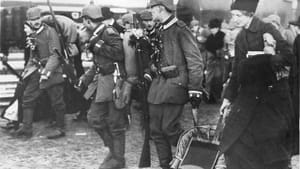Stay in the Loop
BSR publishes on a weekly schedule, with an email newsletter every Wednesday and Thursday morning. There’s no paywall, and subscribing is always free.
What price heroism?
Fringe 2015: Iron Age Theatre's 'A Great War'

World War I was one of the most devastating conflicts in history. A battle that was anticipated to last six weeks erupted into a lethal conflict that raged for four years, resulting in the death of 9 million combatants and 7 million civilians, and plunging the world into political turmoil, a second global conflict, and the Holocaust. In retrospect, it was a catastrophic century, and World War I was the catalyst.
Dozens of plays and films have been written about this tragic conflict, most recently The White Ribbon (2009), War Horse (2011), and Testament of Youth (2014). And now we have a courageous, compelling new play by James Christy Jr., a Philadelphia playwright, calling attention to a lesser known aspect of World War I: the participation of German Jewish soldiers.
A Great War tells the story of Michael Weiss, a young German Jew who enlists in the German army in 1914. His father, a rabbi, challenges his son’s commitment, explaining that he’ll end up killing Jews in opposing armies. But Michael defies his father. “I am a German first,” he cries, determined to show his nationalistic fervor. On the eve of his departure for the front, he bids farewell to his beloved Gisela and resists the temptation of physical love, saying that they’ll consummate it upon his return.
What war makes us do
The action shifts back and forth as we follow Michael and Gisela’s lives during the duration of the war. On the front, Michael becomes a fearless fighter. While his entire 61-man unit is ordered to retreat and perishes as a result, he survives, becoming known as “the soldier who won’t die.” Eventually he’s captured, but escapes, having killed over 200 enemy soldiers in the process. Though he’s deeply conflicted, he’s become a voracious killer.
Back in Berlin, on the home front, Gisela has made a Faustian bargain to survive and gain protection for Michael’s father. She becomes the mistress of Cuttner, a sadistic colonel and Michael’s superior officer. He forces Gisela to read Michael’s love letters, which are filled with sexual longing, while he himself acts out Michael’s fantasies with her. In the end, Michael returns from the front to confront Cuttner, who knew that the aggressive war strategies were unrealistic to begin with, and whose orders to retreat caused Michael’s unit to meet with their demise.
An anguished voice
James Christy, the well-known Philadelphia-based director (and the playwright’s father) directs an ensemble of seven in over two dozen scenes with the same swift, sure hand as he does Shakespeare’s plays. The spare Maas Space in Kensington, a rectangle with brick and stone walls, becomes a perfect venue for the fluid rendering of this gripping, heartbreaking story.
In the well-researched program notes, there’s a quote from a German law student writing from the front: “What is the good of escaping all the bullets and shells, if my soul is injured?” The anguished voice of Michael Weiss, a character of Christy’s creation, represents the 100,000 Jews who valiantly served in the German army. Despite their patriotism, they were accused of disloyalty and subsequently were persecuted. This increased wave of anti-Semitism in Germany added fuel to the already smoldering fire and changed the traumatic course of the history of the Jews in Europe forever.
Combatting anti-Semitism through combat
In conversation, Christy explained to me that he was struck by the belief among German Jews that if they joined the battle, they could combat anti-Semitism by proving their heroism and their patriotism. “I wanted to write a play from the point of view of an individual [Weiss] who gets caught up in the excitement, energy, and religious fervor, who believes ‘that the war will unite us, that God is on our side and will shine down on us in battle and make us indestructible.’ I wanted to show a protagonist going through a war as an ultimate survivor — and finally coming to grips with the lies that started it all.”
Christy added that he found echoes of the Iraqi War in the German strategies of World War I. Looking back, says Christy, the ultimate tragedy lies in the fact that both conflicts were utterly preventable.
What, When, Where
A Great War, by James Christy Jr. James J. Christy Sr. directed. An Iron Age Theatre production. Through September 27 at the Maas Space, 1325 North Randolph Street, Philadelphia. Part of the 2015 Fringe Festival. fringearts.org or 215-413-1318.
Sign up for our newsletter
All of the week's new articles, all in one place. Sign up for the free weekly BSR newsletters, and don't miss a conversation.
